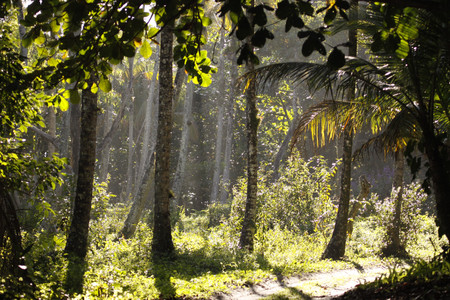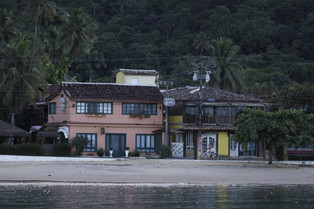Bemvindo a Brasil
- Kate Winstanley

- Jun 17, 2020
- 5 min read
Updated: Jun 20, 2020
The two-week holiday to an idyllic island in Brazil that turned into a three and a half month long adventure hiking to deserted beaches, climbing cloud-wreathed peaks and looking for exotic birds in the rainforest...

Why Brazil?
I was born in a landlocked desert country in Africa. Much as I loved the red sands and stunted trees of the Kalahari, I longed for a gentler world sheltered from the harsh glare of the sun and watered with abundant rain. Cloud-shrouded rainforests, tumbling waterfalls, lichen-covered sloths, whiskered monkeys, fantastical birds with outlandish beaks and jewel-bright frogs were the backcloth to my dream world.
As a sensitive and bookish child, I pored over National Geographic magazine articles about steamy jungles in South America and especially Brazil. I dreamed of one day seeing trees ten times the height of our hardy desert trees, hearing the echoing calls of exotic unseen birds and monkeys high up in the rainforest canopy and feeling the softness of cloud mist on my face.
An avid interest from childhood in observing birds and animals in their natural habitat developed into a passion for wildlife photography in adulthood. I have travelled widely to many countries with outstanding wildlife experiences and am fortunate to have spent several wonderful holidays with family who live on a private game reserve (Welgevonden) in the Waterberg – a beautiful and impressively biodiverse region in Southern Africa. However, the combination of rainforest, tropical beaches, waterfalls and exotic birds had eluded me in my travels so far and I was intent on a wildlife adventure to the tropical rainforests of South America.
Destination Ilha Grande
It was early March 2020 and the Covid-19 pandemic was rampaging across Europe. I had been hugely looking forward to a two-week holiday to Ilha Grande, a sparsely inhabited palm-fringed tropical island on the Costa Verde (Green Coast) in Brazil, some 90km from Rio. However, I was nervous about the rate at which the Corona virus was spreading. As my departure date approached, the British Foreign and Commonwealth Office (FCO) did not warn against travelling to Brazil – indeed only one or two confirmed cases of Covid-19 had been reported there – and my holiday insurance would not have covered the cost of cancellation so I figured I’d take my chances and go on my dream holiday. Two weeks in paradise, or so I thought.
Ilha Grande is one of the last remaining pristine remnants of Brazil’s Atlantic rainforest making it one of the richest ecosystems in the world – it comprises over 190km of mountainous jungle and with much of the island a nature reserve, it is a wildlife paradise especially for birds. Its 90+ beaches, wild and unspoilt, many accessible only by trail or boat, are reputed to be among the most beautiful in the world. It forms part of an ancient mountain range formed when Africa and South America were joined.
The flight out of Gatwick was surreal, the departure hall ghost-empty and masks and hand sanitiser the new social lubricant. I had no idea what lay ahead but felt exhilarated as I embarked on what I felt instinctively to be the adventure of a lifetime, alone and in my 50s, to the land of my childhood dreams. Knowing that the world was changing fast with the Covid-19 pandemic sweeping across Europe heightened my desire to get away from Europe and to see Brazil before everything changed, possibly forever.
Even before the plane landed, I felt an urgency about getting to my final destination. After a restless night in Rio and following a gut instinct I decided to leave immediately and head to my island accommodation, a day earlier than originally planned. There was palpable tension in Rio already, even though the pandemic had not yet taken hold, with beaches starting to close and few people out on the streets. The sight of hooded military police patrolling the streets with huge rifles pointing skywards through the windows of their vehicles increased my desire to get away from the state capital as quickly as I could. I jumped into a taxi and asked the driver to take me straight to the nearest town with boat transport to Ilha Grande, over an hour’s drive from Rio.
I must have caught one of the last boats to take tourists to Ilha Grande. Had I got there a day later - as originally planned - I would not have been permitted to enter the main port of Abraão as ferry and boat traffic was restricted the very next day to island residents only as a measure to control the spread of the Coronavirus.
Arrival in Abraão
Speeding across the 23km ocean strait that separates Ilha Grande from the mainland I was reminded of the island’s reputation for seclusion. It was tused to quarantine suspected cholera patients arriving from Europe and in the twentieth century was the location for one of Brazil’s most notorious top-security prisons for high risk political prisoners. Cândido Mendes is where the infamous organised crime syndicate, Comando Vermelho, was founded in the 1970s.
As our boat approached the island, I marvelled at the towering mountains rising dramatically from the sea, their peaks wreathed in clouds, and could not wait to discover some of the birds and animals that inhabited the verdant green rainforest that covered their steep slopes. I was enchanted by the scattered islands in the bay. Each looked like a perfect treasure island complete with coconut palms, a crown of lush tropical forest and boulder strewn beaches. Frigates and gannets rode the thermals high above, occasionally plummeting into the green-blue sea. Traditionally crafted wooden fishing boats and simple sailing boats plied their way lazily across the calm waters of the bay of Abraão.
The boat headed into the picturesque harbour town of Abraão with its long curving sandy beach fringed by coconut palms and lush trees with low-lying brightly coloured houses lining the beachfront. In stark contrast to the sleepy feel of the town the pier was alive with purposeful activity. Cargo was being unloaded from boats of various sizes and shapes by weather-beaten locals who piled goods onto hand pulled wagons. I remembered that Ilha Grande is a car-free island so the carreteiros – the men who operated the wagons – played an essential role in transporting goods on the island.
What adventures lay ahead, I wondered as I sipped a cold beer from a beach bar and surveyed my new island residence, suitcase and backpack containing my precious Canon camera for bird photography by my side. I was about to find out, and hired a carreteiro to take me to my digs, a well-equipped little studio at the top of a steep slope set among palms.
Little did I realise then that what was meant to be a two week holiday would turn into a three and a half month staycation.






























Comments